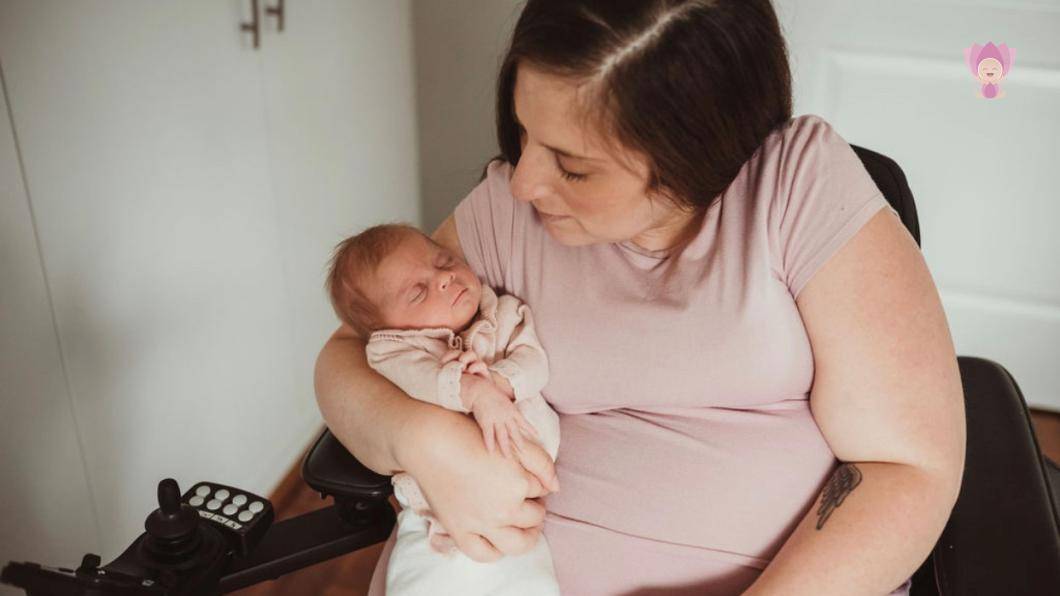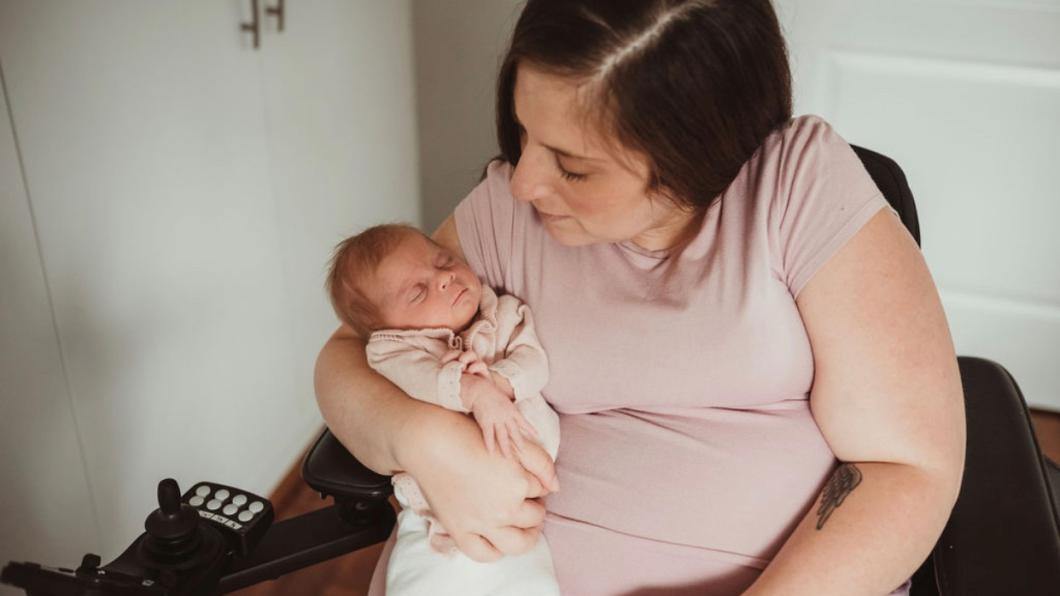Disabled women face serious care gaps after giving birth


Photo of Gabriella Carafa with baby Giovanna. Read Gabriella’s story of her journey to parenthood.
By Louise Kinross
Disabled Ontario women say their health care crumbled after they gave birth, according to a qualitative study published in March in the Journal of Advanced Nursing. The study, one of the first to look closely at postpartum support for people with disabilities, found after-birth care was spotty. When it was provided, it wasn’t tailored to the person’s disability. For example, deaf participants couldn’t access sign-language interpreters in hospital or at well-baby checks. Mothers with physical disabilities found staff inflexible in adapting breastfeeding techniques to their needs. “There were no resources,” one of the 31 participants said. “I just had the baby and ‘We’re done with you.'” BLOOM interviewed co-investigator Hilary Brown, assistant professor in the department of health and society at University of Toronto Scarborough.
BLOOM: Why was there a need for this study?
Hilary Brown: There’s been some work showing that women with disability are at elevated risk for complications during pregnancy and that they often face barriers accessing pregnancy care as well. We know that one in eight pregnancies are to women with a disability, so this is a clinically important issue. But less research has focused on the postpartum period. We wanted to understand what goes on after they’ve given birth and are transitioning home with their baby.
BLOOM: The women who said care vanished reminded me of what happens to youth with disabilities who fall off the ‘care cliff’ when they transition to adult care. The health system seems unable to attend to the lifelong needs of people with disabilities.
Hilary Brown: I completely agree. I’m thinking of a comment from one individual who talked about all the support they received in pregnancy, because they were labelled high-risk: ‘If I was high risk in pregnancy, how does that disappear once I get home?’
BLOOM: What were your key findings?
Hilary Brown: We found three major themes. The first is a lack of adequate care. Supports completely fell away in the postpartum period.
The second was the lack of provider awareness about disability and accommodations people needed. For example, there was a lack of knowledge about how to manage pain in people who experienced flares in their [conditions] postpartum, and how to prevent people from having crises when they went home.
Lack of disability awareness bled into newborn care. So not understanding that deaf participants needed an ASL interpreter when they went for the baby’s first check-up with the pediatrician.
There was a lot of inflexibility. Participants would say that the way the lactation consultant or nurse told me to breastfeed didn’t work. ‘I showed them what did work, but they didn’t want me to do it that way.’ There was a lack of ability to adapt to someone’s specific needs or to think creatively.
The third thing was this real fear of judgment and discrimination. We saw this especially in the postpartum period. Once people went home with the baby there was a sense that others were making judgments about their parenting abilities, watching them really closely and being quite intrusive.
Several commented that they had declined supports, like a visit from the public health nurse, because rather than it being offered in a strengths-based and positive way, it felt like the person was on the lookout to judge their abilities. Fear of judgment about their parenting was a big piece and wove into being fearful to reach out for support with breastfeeding or mental health.
A lot felt they were being held to a higher standard than other parents. Every parent goes through a transition when they take their baby home and every parent has different struggles, whether with breastfeeding or sleep or postpartum depression. But these participants felt providers put an extra layer of requirements on them that wasn’t realistic.
BLOOM: Did anything surprise you about what you heard?
Hilary Brown: Sadly no. Based on the literature and what we’d heard broadly about pregnancy care, a lot of things fit with what we were expecting.
Something that was really interesting was we were looking across disabilities that included physical, sensory and intellectual disabilities. A lot of what we heard applied across all groups, but in slightly different ways. So accessibility issues in the physical environment applied to someone with a mobility disability, but communication barriers affected those with sensory or intellectual disabilities. Despite very different experiences, there were common threads of practical things that could have helped everyone.
BLOOM: I was struck by the story of one mother whose baby had heart problems and eventually died. The parent found the NICU completely inaccessible. ‘It’s just assumed that the parents are fully abled, right?’ she said. She was blind, and the staff didn’t orient her to the equipment her baby was hooked up to, so she was afraid to touch her baby. She was prevented from touching her baby, who only lived for a few days.
Hilary Brown: Heartbreaking. It really speaks to the need for simple training for health-care providers as to what basic accommodation needs are, and their responsibility to provide them. It’s a human right. There’s a lot of poor communication and negative assumptions on the part of providers.
BLOOM: It seemed participants were afraid to ask for help or to say something was challenging, because they didn’t want to be viewed as a bad parent. And that impacted their mental health.
It’s important to emphasize that none of these experiences are universal. Some participants had midwives who did home visits postpartum, and they felt well supported because they’d already built a relationship of trust and respect with them.
For participants who didn’t have a good provider relationship, there was fear and hesitancy to reach out.
It goes back to the transition issues you mentioned. A couple of participants talked about having incredible obstetricians who were extremely helpful and had specific expertise related to disability. But when they looked for a pediatrician for the baby, they wanted someone who was disability-affirming and had that knowledge of maternal disability, and they couldn’t find it.
BLOOM: What changes are needed to make postpartum care disability-friendly?
Hilary Brown: It partly boils down to education for providers. We’re working on some papers where we interviewed providers and heard that they don’t receive disability-related training. One of the starting points is to have better knowledge and resources for providers.
Another piece is to have a structure in place that allows for the transition from the obstetrician to the family doctor or pediatrician. There needs to be a care plan or a transition document or a health-care navigator that helps to outline the needs and ensures continued supports.
More broadly, we need supports tailored to people with disabilities. For example, we heard from some people that mental-health support would have been more useful if it had been delivered by someone who had a disability. We need to tailor existing supports to the needs of people with disability.
BLOOM: I’ve heard positive things about the Accessible Care Pregnancy Clinic at Sunnybrook Hospital, which is dedicated to this population. Do we need more dedicated clinics? Or can disability-specific care become part of the mainstream?
Hilary Brown: People ask me this all the time. I’m torn. I do think more clinics like that are needed. But the issue with specialized clinics is they tend to be in larger urban centres that aren’t useful for people in rural areas who have to travel long distances to receive care.
On the flip side, rural obstetricians or family physicians might only have one or two pregnant people with disabilities in their practice in their entire career.
So we need broader training so other health-care providers can provide the basic standards of care. We need some sort of formal consultation system where a provider can say ‘I have a pregnant patient with a disability and I have these questions about them.’ But it can’t just be done informally. It needs formal structure and funding.
BLOOM: Your study reminded me of other recent studies about how little training acute-care doctors and nurses get in working with patients with autism. Now we have a trend of autistic people being hospitalized because they can’t get what they need in the community, and hospital staff are ill-trained to care for them.
Hilary Brown: I agree. What we hear from the physicians we talk to is if they hear anything about disability, it’s as a health outcome, not as a population seeking health care. They might learn about autism as a neurodevelopmental disability and hear about the symptoms, but they don’t learn about the needs of autistic people who are accessing care. It has to do with the medicalization of disability and needs to move to a rights-based, equity-based framework.
It’s interesting that there’s a lot more emphasis now on diversity and inclusion in medical school. A lot has focused on racism, which of course is incredibly important. But we’ve left disability out of that conversation. It would be such an easy add to add ableism.
BLOOM: The kind of gaps you see in postpartum care for disabled moms are potential safety hazards.
Hilary Brown: They’re very serious. They can put mom and the baby in danger. In other parts of our research we’re using health administration data to look at health outcomes, and we see higher rates of postpartum ER visits and hospital admissions and other complications for mothers with disabilities. We can’t directly link those to our qualitative findings about postpartum care. But we can infer that the gaps could potentially be part of the reason for these kind of serious consequences at a population level.
Like this story? Sign up for our monthly BLOOM e-letter. You’ll get family stories and expert advice on raising children with disabilities; interviews with activists, clinicians and researchers; and disability news.
















Leave a comment